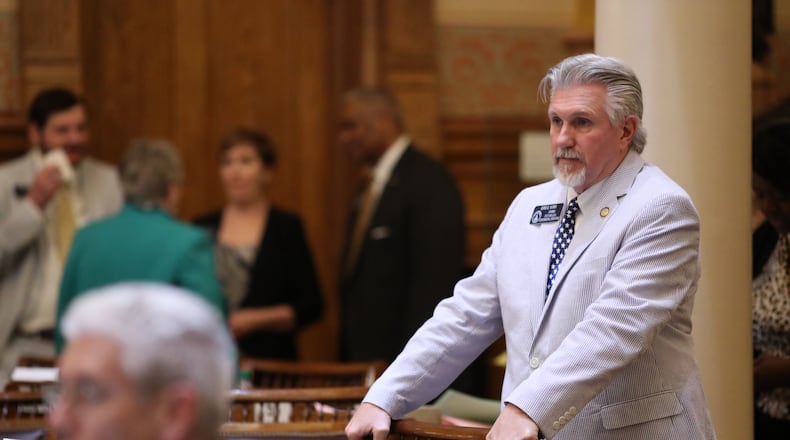Adult survivors of child sexual abuse are accusing the Georgia Senate of siding with predators.
“Either you’re on the side of survivors,” said Alan McArthur, 54, who said he was sexually abused by a Boy Scout troop leader decades ago. “Or you decide you want to stand with pedophiles.”
McArthur was part of a group of victims, lawmakers and plaintiffs’ attorneys who assembled at the Capitol just before the start of the final day of this year’s legislative session Thursday, in a last-ditch effort to save the Hidden Predator Act.
They blasted the Senate for weakening the legislation, which was originally written to allow adults up to age 38, and in some cases beyond that, to sue both those they accuse of molesting them when they were children and the organizations they say knew about it and kept it secret.
House Bill 605 passed the state House of Representatives unanimously last month, but was amended by the Senate Judiciary Committee in a way that would make it impossible for many older, alleged victims to sue “entities,” such as the Boy Scouts, for covering up cases.
The protest had little effect. Later in the day, the Senate voted 51-0 for the committee’s version of the bill with an additional amendment that, said Spencer, makes it even harder for victims to sue. It increases the burden of proof to “near entity immunity,” he said.
The committee changes that led to the full Senate’s vote were “disgusting,” said Monica Matthews, who said she was molested as a child. “It is a horrible betrayal.” (Matthews hosts a program on WSB Radio 95.5 and AM 750, which is owned by Cox Media Group, the owner of The Atlanta Journal-Constitution.)
Esther Panitch, a lawyer for clients who are suing the Boy Scouts, accused members of the Senate committee of having conflicts of interest due to associations with entities accused of harboring pedophiles.
Sen. Bill Cowsert, R-Athens, is a partner in a law firm that was, until recently, representing a church accused of concealing sex abuse by a Boy Scout troop leader. Cowsert's chief of staff has said Cowsert had "no personal involvement" in defending the church, which was represented by his law partners.
Sen. John Kennedy, R-Macon, is a Boy Scout volunteer, and an associate lawyer in the law firm where Kennedy is a partner is the enterprise risk management chairman for the executive board of the Central Georgia Council of the Boy Scouts of America, according to the lawyer's biography on the firm's website.
Kennedy said through a Senate spokeswoman Thursday that a review of the Senate rules and a check with the Secretary of the Senate confirmed he had no conflict of interest in voting on the legislation.
“I volunteer for the Boy Scout Organization in middle Georgia but do not serve as a paid advisory member and have never served in that capacity. I am not aware of any claims against the Boy Scout Organization where I volunteer. While at my current firm, we have not represented any Boy Scout Organizations in cases dealing with what would be addressed in HB 605,” Kennedy wrote.
Sen. Greg Kirk, R-Americus, serves on the committee with Kennedy and defended its work, saying, “Please don’t try to throw my colleagues under the bus.” He was invited to speak at the news conference because he is shepherding the legislation through the Senate for the chief sponsor, Rep. Jason Spencer, R-Woodbine.
Kirk is a licensed professional counselor who has worked with sex abuse victims and said he understands what’s at stake for them. But he said organizations have rights, too, and the Senate needed to balance that.
“I don’t see what’s been alluded to here — that there’s been collusion or coercion,” Kirk said. “We are a deliberative body and we do want to do what’s right.”
Kirk was responding to what one of the plaintiff’s lawyers had said. Brian Cornwell, who represents a Savannah woman suing USA Gymnastics in connection with convicted molester Larry Nassar, said child victims typically don’t understand what happened to them and the psychological harm it caused until much later in life. That’s why the statute of limitations for lawsuits, currently age 23, needs to be extended, he said.
“If you want to be on the right side of history and you’re in the Senate, pass the bill,” he said.
Spencer later took to the House floor to lambaste the Senate leadership, comparing it to Pontius Pilate. He’d said the same thing at the news conference, condemning the Senate for “failing to stand up for justice and choosing instead to wash its hands.”
The issue is resonating with Senate leadership. Minutes before the 9 a.m. news conference, Lt. Gov. Casey Cagle’s office issued a statement calling the intentional concealment of child abuse “as immoral and reprehensible as the heinous crimes themselves.”
Cagle had called on the Senate “to strengthen our laws and stand strongly against the worst elements of our society who victimize and exploit children.” He said he was grateful that so many supporters of the legislation had shared personal stories, and he said, “now the Senate must act.”
Cagle spokesman Danny Kanso said before the floor vote that Cagle wanted a bill that would give survivors more than the version that emerged from the Senate committee did. “We expect both chambers will come together and move forward legislation that allows victims to obtain justice,” Kanso said.
The House disagreed to the Senate changes, setting up the possibility of a last-minute conference committee to work out the differences.
Staff writer Jeremy Redmon contributed.
About the Author



